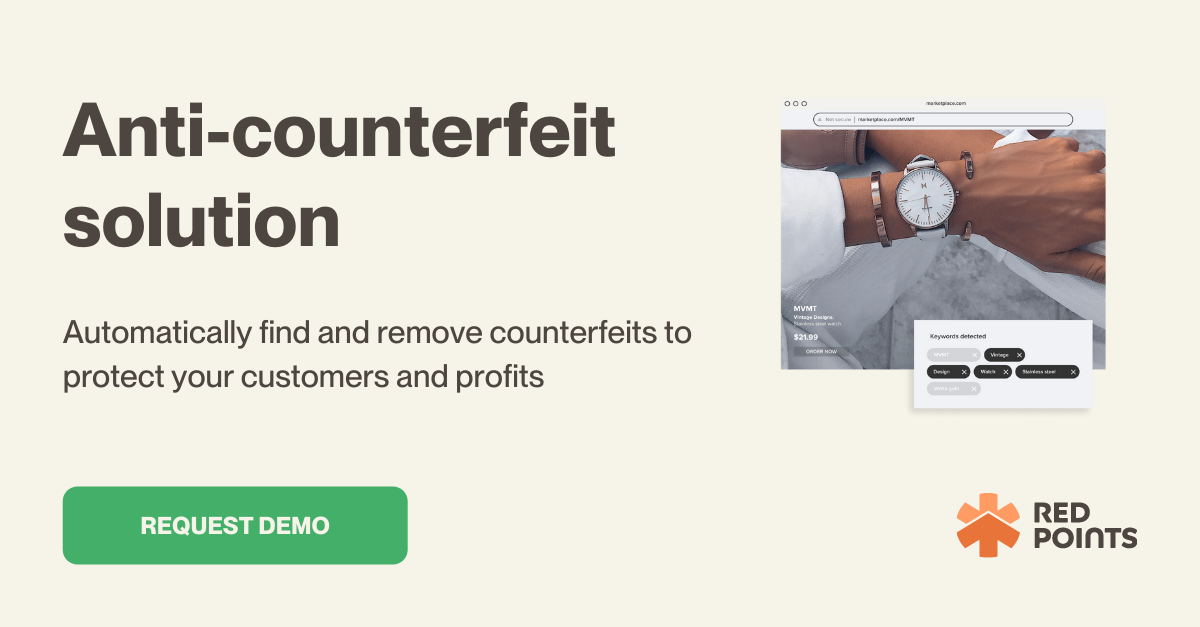Due to the popularity of online retailers, scammers have developed new strategies to take advantage of consumers who like to buy a wide variety of goods, such as consumer electronics, home furnishings, or clothing online. The growing vastness of online commerce now allows scammers to operate with a sense of confidence as a result of their perceived anonymity and an endless supply of potential targets.
Although counterfeiters pose a significant threat to legitimate businesses, the magnitude of the damage caused by knockoff products is often overlooked.
In this article, we’ll look at:
- What knockoffs are
- How to register a complaint if you receive a knockoff
- How to prevent knockoffs of your brand and your products
What is a knockoff?
Although the terms knockoff and counterfeit have different legal definitions, they are commonly used interchangeably in everyday conversation. Products that are considered knockoffs are products that seem similar to another product but don’t steal the trademarked name or logo and are therefore not infringing upon those trademarks. However, if buyers are confused by the number of similarities between the supposed knockoff and the original product, then whoever is behind the knockoff may still be breaking trademark regulations.
What is the difference between knockoff, replica, and counterfeit?
Both replicas and fakes are copies of a particular product, but their meanings vary depending on the context in which they are used. The term “replica” is used to describe an item that is not genuine but aims to copy the original item closely while cutting corners in manufacturing in order to maximize profits. Whereas “fake” is often used to refer to something that is of even lower quality than a replica.
Knockoffs, however, are an entirely different type of item, simply because they intentionally push the boundaries of what most brands can legally define as infringement. Examples of knockoffs could be anything from sunglasses with the branding of “Grucci” rather than the genuine brand, “Gucci”. And while this may be an outlandish example using a luxury brand as an example, knockoff production actually occurs on a major scale to many brands we interact with regularly and often without their knowledge.
Knockoffs are a major problem for brands not only from a branding perspective but can be dangerous for customers as well. In the cases of industries like pharmaceuticals or construction, knockoffs might seem like genuine products, but might be lacking in terms of quality control. For instance, during the Covid-19 epidemic markets were suddenly flooded with knockoff N95 masks, which put many at risk.
Is selling knockoff products illegal?
USA
In the United States of America, it is a crime to sell fake goods. In cases when people are hurt or killed directly by the knockoff products, the severity of the charges will increase.
The maximum fine for a first offense at the federal level is $2 million, and the maximum possible jail sentence is 10 years. All future violations are subject to a maximum of 20 years in jail and a $5 million fine.
United Kingdom
Some so-called paramilitary groups rely on the profits from the sale of these knockoff commodities to support their operations. Through the distribution of counterfeit and contraband products, criminal organizations may rake in millions of pounds.
Call the Citizens Advice consumer hotline on 03454 04 05 06 if you feel you or someone you know has been sold knockoff products.
China
Presently the laws and regulations governing anti-counterfeiting in China are as follows:
The Trademark Law (2001) and the Implementing Regulations of the Trademark Law (2002); the Anti-unfair Competition Law (1993);
the Copyright Law (2001) and the Implementing Regulations of the Copyright Law (2002); and
the Criminal Law (2009).
Article 53 of the Trademark Law provides that the Administration of Industry and Commerce (AIC) may also pursue enforcement action: “Where any party has committed any of such acts to infringe the exclusive right to use a registered trademark as provided for in Article 52 of this Law and has caused a dispute, the interested parties shall resolve the dispute through consultation; where they are reluctant to resolve the matter through consultation or the consultation fails, the trademark registrant or interested party may institute legal proceedings in the People’s Court or request the administrative authority for industry and commerce for actions.”
Use of an identical trademark on identical goods without the registered owner’s permission is punishable by up to three years in prison and a fine, or a separately imposed fine, under Article 213 of the Criminal Law of the People’s Republic of China; in more serious cases, the court will sentence the counterfeiter to three to seven years in prison and order a fine.

How to report knockoff products
The idea that there are people in the world who would steal an idea from someone else and pass it off as their own may be difficult to comprehend. However, when cash is on the line, people tend to go toward the most easily monetized options. Despite this, there are steps you can do to safeguard your brand:
1. Secure your intellectual property rights.
A company or product is better off with more legal safeguards if it can acquire them. We need patents, even on ideas at the preliminary stage. When discussing the specifics of your product with others, you should also use non-disclosure agreements (including employees).
In addition to the security that might be offered by the use of a patent, a trademark can be an additional safeguard. Your registered trademark can act as hard evidence of your concept in the event of a legal dispute. It also serves as a record of the exact moment you had the inspiration for your project.
2. Try something completely different
In principle, patents are a great tool to prevent theft, but there are ways to get past the law. There will be those who find loopholes in it, and those who will openly violate it, daring you to sue them. In this light, having a truly original idea that can’t be copied is preferable to having a patent.
3. Put imitators on the spot and make them defend their work.
If you notice a copycat in the wild, it’s best to go toe-to-toe with them right away. Don’t panic; your attorney could take up to three weeks to respond. Get in touch with the management of the fake company. Tell them a) you don’t like it when they steal your ideas and b) you’ll do whatever it takes to shut them down legally. While this may not always deter them, they will at least know who they are playing with.
4. Prove your worth with excellent assistance.
Products can be swapped out with ease. It’s possible that some other warehouse could produce your little plastic gadget just as precisely as your own. Quality customer service, however, is not so simple to imitate. If you provide excellent service to your consumers, they will return again and again.
5. Create a loyal following.
It would be great if your work was safe from imitators. What if, though, there were still copycats around, but they presented no genuine danger? You can achieve this by putting effort into building customer loyalty to your brand.
Customers are less likely to defect to a cheaper imitation when you’ve spent years cultivating their devotion to your brand. They will think about everything and still choose your brand in the end.
6. Concentrate on your own business.
Most businesses fail not because of the competition but because their CEOs can’t shut out the distractions. You should not let copycats into your thoughts even as you confront and question them. You need to stop worrying about the competition and start concentrating on your own business and offerings.
How to prevent knockoffs of your products?
The last thing any business owner needs is to learn that a less-than-stellar corporation is mass-producing and selling knockoffs of their goods. Although there is no foolproof method of preventing the production of counterfeit products, there are measures you can take to reduce the likelihood that someone would try to pass off a knockoff as the real thing. These include:
Trademark registration
This is the first and foremost step to safeguarding your product’s reputation. Even while you have rights from the moment you produce your goods, those rights are not as obvious or straightforward as they become after registering your trademark. It is also important to register your trademark with US Customs, as they are responsible for preventing the entry of counterfeit goods.
Register trademarks in foreign markets
Obtain trademark protection in all jurisdictions where your company may conduct business. Although you may not be exporting the goods at the moment, registering your trademark in Canada, Mexico, or any European country is a good idea if you ever decide to deliver the product there. To prevent suppliers and vendors from stealing their ideas, many multinational corporations also register their brands in all countries where they get goods and services.
Register in China
Many knockoffs originate in China, so securing trademark protection is important if you can. At present, you may not have many options if you discover that your product is being counterfeited in China. A cease-and-desist letter (written in Chinese, of course) might be sent, but its effectiveness is uncertain. Using Chinese courts is, at best, a risky and perhaps expensive venture. While improvements in China’s regulatory environment are still on the horizon, now is the time to register your trademark before it’s too late.
Search for knockoff listings online
Your first step should be to actively seek potential outlets selling counterfeit goods. You can find pre-existing processes to help you prevent illegal sales on several US ecommerce platforms, such as Amazon or eBay. Regularly checking a variety of ecommerce platforms can help you catch unauthorized sellers or cases of infringement before they spiral out of control.
Invest in brand protection software
Manually searching for listings for knockoff products online could take hours or even days to detect only a few listings, making it not only impractical but also expensive when you consider the manpower it requires. Fortunately, you can invest in brand protection technology like Red Points’ Anti-Counterfeiting Software, which can not only scan thousands of web pages instantly to detect trademark infringements but can also be automated to submit takedown requests instantly. This means that you can shut down counterfeiters and keep your products safe without having to lift a finger.
What’s next
Producing knockoff goods hurts not just businesses but also deals a devastating blow to the economy of any nation. Utilizing cutting-edge technologies and raising awareness is essential in the battle against counterfeiting.
Due to knockoff products, many businesses have suffered enormous losses in the form of lost sales, unhappy customers, permanent reputational harm, and more.
The cost of producing knockoff goods directly impacts tax receipts and government spending. Additionally, it has a negative effect on employment, which is felt by retailers, suppliers, and the supply chain.
Find, track, and remove counterfeit listings from the source with technology.






